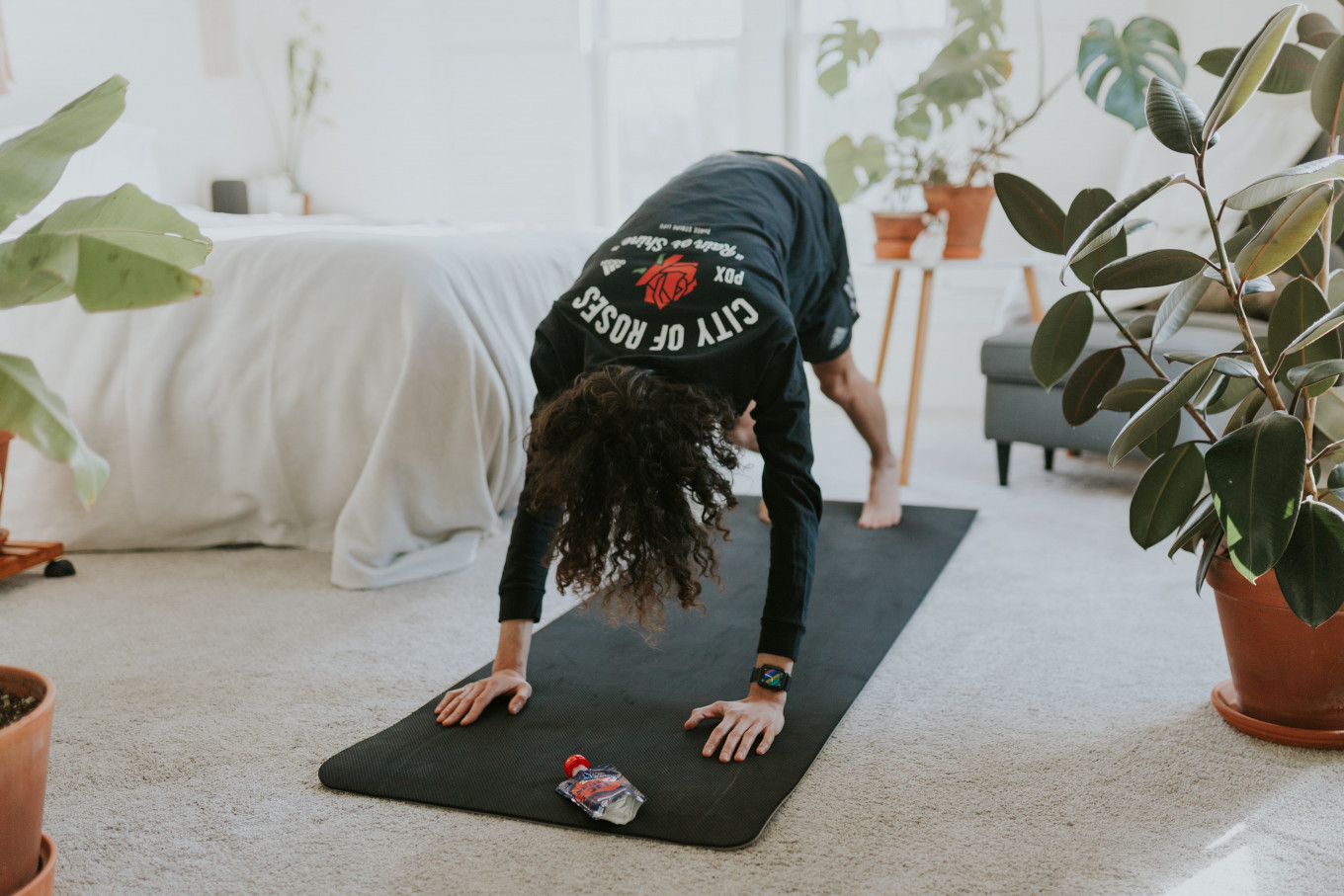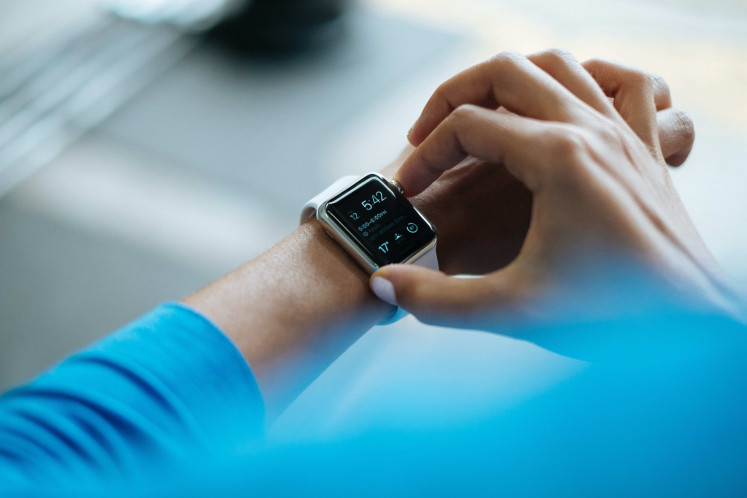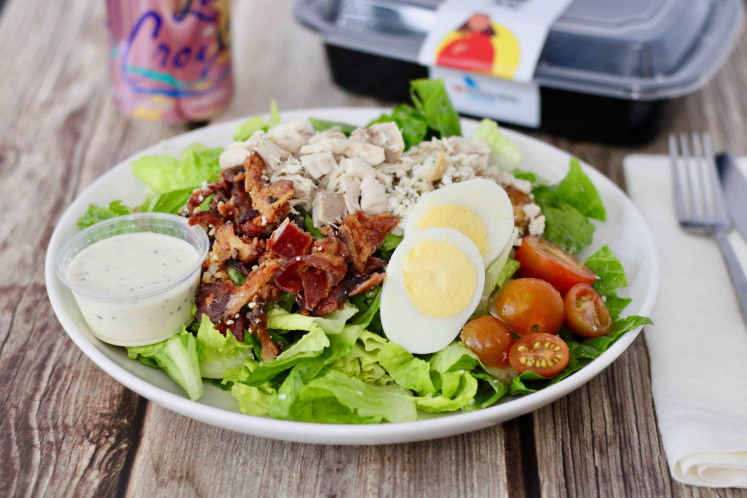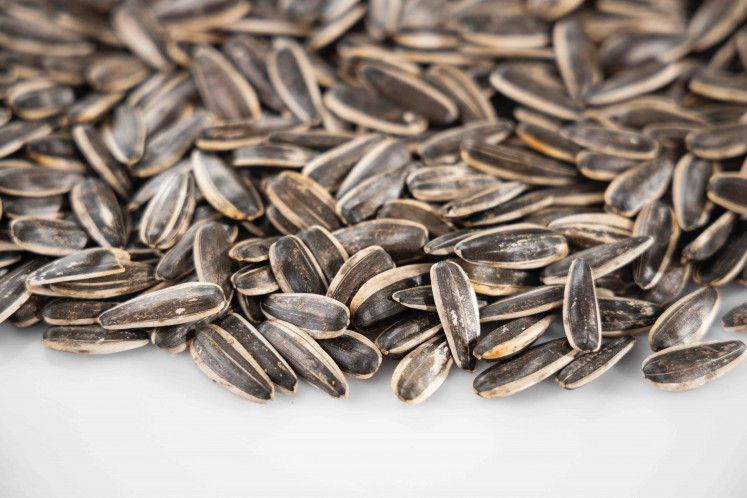Popular Reads
Top Results
Can't find what you're looking for?
View all search resultsPopular Reads
Top Results
Can't find what you're looking for?
View all search resultsTwenties: How to not gain (more) weight while working from home
With the lack of physical activity, working from home makes losing — or not gaining — weight harder. What can be done?
Change text size
Gift Premium Articles
to Anyone
"Twenties" is a new column that offers The Jakarta Post's top 20 of everything under the sun, from history to pop culture and food to lifestyle.
For many, working from home (WFH) has become the norm. While this arrangement has many benefits, such as avoiding the city’s awful traffic, or an increase in personal time, it has left many helpless in facing their number-one enemy: weight gain.
Here are twenty ways to prevent weight gain during the WFH era.
1. Stick to an eating schedule
According to Dinda Arkan, a registered dietitian working for Dapurfit, having a regular eating schedule that works for one’s body can help reduce the risk of overeating. When one has an orderly eating schedule, the body becomes more sensitive to signals of hunger and satiety, which can reduce the urge to snack off-schedule.
2. Drink more water
Human brains often mistake thirst for hunger, says Melina Jampolis, an internist and board-certified nutrition-specialist physician. When the mind signals hunger, it could actually be mild dehydration instead. Drinking water can increase satiation because it passes through the system quickly, and sends messages to the brain signaling fullness.
3. Do not eat whilst working (or playing video games)
According to Ineu Ayu Wulandari, a dietitian working for Bandung’s Immanuel Hospital, West Java, eating while doing something else will lessen your focus on the activity of eating itself, and therefore cause you to mindlessly eat more, especially when you are snacking on chips or sweet food. Practice eating mindfully, without distractions.
4. Take a morning jog or walk before breakfast
You do not have to go to the gym to do cardio. Taking a morning walk or run, especially before breakfast (drinking water or eating fruit is fine), can help break down more fat, according to Ineu.
5. Track your calories
While not urgent, especially for those not struggling with nutritional problems such as high cholesterol, high blood pressure or being overweight, it is never a bad idea to know more about your own body. Find out how many calories you consume by using a fitness tracker or calorie-counter website or app. But more importantly, regulate your diet, says Ineu.
Daily exercise: Use a fitness tracker to track how many calories you are burning daily. (Unsplash/Luke Chesser) (Unsplash/Luke Chesser)6. Get adequate sleep
Ironically, working from home often leads to people getting less sleep, mostly due to lack of a wake-up time schedule, but also because of too much screen-time and other forms of entertainment. Waking up late often results in craving extra calories late at night, even though the brain may just send the body a signal to drink more water. Not getting enough sleep may lead to overeating, says Ineu.
7. Maintain calories in = calories out
For those wanting to reduce body weight, a calorie deficit — when one consumes fewer calories than one burns — is necessary; but otherwise, maintaining one’s caloric intake and outtake in roughly equal numbers should do the trick. However, Ineu warns that a healthy human body needs calories to operate, and when the body does not get enough of them, it may actually slow down its metabolism.
8. Have an early dinner
By having your last meal of the day at 7 p.m. or earlier, you can prime yourself for weight loss. According to clinical nutritionist Dr. Rupali Rutta on Food NDTV, an early dinner is good for digestion, which aids weight loss. The body also switches into “self-repair” mode at night, and therefore does not need more food to digest. Dining late in the evening leads the body to simply retain the excess of calories as body fat.
9. Be mindful of your online delivery meals
Online food delivery is all the rage, but it is too easy to just order food without considering its nutritional balance. Ineu recommends that when ordering in, restrict the greasy, fried food and make sure to toss in some veggies and fruits.
10. Less carbs, more protein
A low-carb, high-protein diet is not necessary when it comes to maintaining body weight, says Dinda Arkan, a registered dietitian working for Dapurfit. What is necessary is regulating the portion of one’s meal to carbs intake. For example, if you are used to eating two cups of rice per day, change it to one cup. High protein intake is recommended, because protein has a high level of satiety — it keeps you feeling full for a longer time.
What goes in: High protein is recommended because protein has a high level of satiety that keeps you feeling full for a longer time. (Unsplash/Logan Jeffrey) (Unsplash/Logan Jeffrey)11. Move as much as you can
Sitting for a long period of time is unhealthy and can cause back and neck pain. Moving throughout the day, no matter how little, can actually add up to more activity than you realize: walk to the kitchen to refill your glass of water, or do simple chores like throwing out the trash or walking your dog outside for 10 minutes. Ineu says these small activities can have a big impact, especially when they are done every day.
12. Ask for support from those you live with
If you live with someone, ask them to help keep you in check. They can help with simple things such as making sure a strict diet is kept or reminding you to exercise. Those who live alone can also utilize exercise-reminder apps.
13. Set up a workout area
The right environment can create a certain mood. If you find it hard to muster the motivation to exercise at home, creating a designated workout area may do the trick. Seeing a spot with a yoga mat, lifting bar or dumbbells, or whatever exercise equipment you have, might motivate you to actually use it.
14. Set time for fitness breaks
At the end of a long day of work, you might not have much motivation left for exercising. For those lucky enough to be able to take short breaks during working hours, doing quick bursts of exercise throughout the day may be the way to go. Set a timer for every few hours, and do a five to ten minute high-intensity interval training (HIIT) or yoga exercise.
15. Less soda, more smoothies (or better yet, whole fruits)
It is normal to crave sugar or something sweet, but rather than, say, going for a soda, it is better to get your sugar fix from a natural source such as fruits. Make a smoothie of your favorite fruits — and possibly vegetables — without adding artificial sweeteners such as syrups or ice cream. Or better yet, just consume fruits whole, recommends Ineu.
Healthy drinks: Rather than going for a soda, it’s better to get your sugar fix from a natural source such as fruits. (Unsplash/Giorgi Iremadze) (Unsplash/Giorgi Iremadze)16. Sign up for online classes
Knowing that you are supposed to exercise at home is one thing, but actually going through with it is another matter. Signing up for online classes — from yoga to crossfit — may help, since it provides a class setting or a coach to keep one motivated and accountable. Working out in a class setting, where there are other people, can also be helpful since it provides a sense of togetherness and even healthy competition.
17. Do not drink alcohol everyday
It is easy to imagine why people would drink more alcohol whilst working from home — boredom, stress, self-isolation. And while alcohol contains sugar, and essentially carbs, Ineu says that as long as one is not drinking alcohol in a large amount every day, it should not have a large impact on one’s body weight.
18. Include seeds in your diet — not on a daily basis, though
High in antioxidants, vitamins and minerals, nuts and seeds such as pumpkin seeds, sunflower seeds and walnuts should be included in your diet. Compared to cake or potato chips, seeds are definitely on the healthier side of snacks, says Ineu.
Alternative snacks: Nuts and seeds such as pumpkin seeds, sunflower seeds and walnuts make healthier snacks. (Unsplash/Engin Akyurt) (Unsplash/Engin Akyurt)19. Brush and floss your teeth after eating
Brushing and flossing teeth after eating may help limit desire to snack or eat between meals unnecessarily, since it makes the food taste different — arguably, not as good. However, Ineu says one should not brush and floss immediately after eating, since it may erode tooth enamel. Do it 15-30 minutes after eating instead.
20. It is a long game — be consistent
Changing habits and pivoting to a healthier lifestyle is not a one-night process. Rather than doing too many things all at once, just focus on one thing — for example, cutting down on sugar. In the long run, your consistency will matter most.














